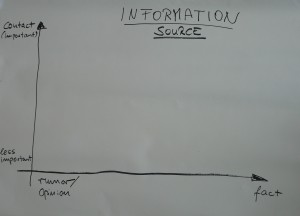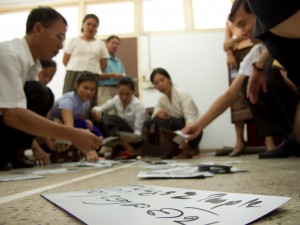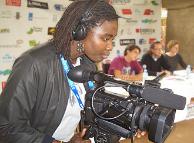Using an “axis of importance” diagram to evaluate sources
 Out of one workshop at NUOL came a good tool that fits perfectly into that quest. It’s a diagram that helps journalists evaluate their sources (see photo at left, click to enlarge).
Out of one workshop at NUOL came a good tool that fits perfectly into that quest. It’s a diagram that helps journalists evaluate their sources (see photo at left, click to enlarge).![]() read more
read more
An inside look at Bhutan’s first TV program for kids
Thinley Yangchen Dorji, a producer at the Bhutan Broadcasting Service Corporation (BBS), takes us on a tour behind the scenes of Bhutan’s first homegrown TV show for kids. Called “My World”, it’s a 30-minute program for youngsters aged eight to twelve that began airing regularly in January. Welcome to “My World”!
Prior to “My World” there were no Bhutanese television programs for children. Foreign programming available via satellite was entertaining but had little educational value. Pema Choden, BBS’s General Director until the end of March 2011, approached DW-AKADEMIE for support. Her aim was to have a quality program tailored to children in Bhutan.
![]() read more
read more
Educators embark into a new era of journalism in Laos
 Is there a proper definition of journalism in the Lao language? Since DW-AKADEMIE’s first workshop on journalism at the National University of Laos in Vientiane, there is. It was conceived by 15 staff teachers of the Department of Mass Communication at the Faculty of Letters – after long discussions revolving around somewhat abstract terms like “media”, “the public”, “society” and “information”.
Is there a proper definition of journalism in the Lao language? Since DW-AKADEMIE’s first workshop on journalism at the National University of Laos in Vientiane, there is. It was conceived by 15 staff teachers of the Department of Mass Communication at the Faculty of Letters – after long discussions revolving around somewhat abstract terms like “media”, “the public”, “society” and “information”.
Lao is not a language that lends itself to describing abstract ideas. Yet the 15 teachers feel it was worth the effort to lay a foundation they now can build upon. They are learning the mindset, tools and skills that in combination make a journalist. The reasoning behind this is that they are the ones training a new generation of Lao students who are eager to take on the profession.
![]() read more
read more
Creating a new morning show in Vietnam
What does it take to produce a successful radio program? And how can you motivate the people in northern Vietnam's Quang Ninh Province to tune in? That's what the radio staff of Quang Ninh Radio & TV and DW-AKADEMIE are exploring at the moment in cooperation with Friedrich Ebert Stiftung and Vietnam's Academy of Journalism and Communication.
This week, DW trainers and QTV radio journalists drew up plans for a new morning radio show. It will be called "QTV Rush Hour" and will run between 6:30 and 7:30 every morning. The show will include music, information and audience participation elements.
On Thursday, March 31st, the Vietnamese journalists recorded a pilot for the new morning show. If all goes well, the show will start airing live next month.
Text and pictures: Thorsten Karg, DW-AKADEMIE trainer
Talented African journalists tell their stories
 African journalists have long voiced their concerns about the way Africa is often misrepresented in the media of developed countries.There's no single Africa. It's a vast continent. A continent of diverse peoples and a continent with complex problems to solve.
African journalists have long voiced their concerns about the way Africa is often misrepresented in the media of developed countries.There's no single Africa. It's a vast continent. A continent of diverse peoples and a continent with complex problems to solve.
African Stories is an opportunity to start setting the record straight by supporting African journalists to tell their stories the African way. How do they see their own country and their continent? What issues do they consider relevant? What stories do they want to tell?
![]() read more
read more
More than films – running a film festival
Once again the Berlinale is bringing together film-makers, critics and fans from all over the world. Every year to coincide with this important film festival, the DW-AKADEMIE conducts an intensive five week workshop: Film Festival and Film Management for young festival promoters from Africa and Asia.
Arthur Mataruse from Capetown, South Africa, and Luzviminda Casagan from Pesay City in the Philippines are among the participants. Mataruse works for Encounters and the Out in Africa Film Festivals and Casagan works for the Cinemalaya Independent Film Festival.
We spoke to both of them to find out more about film festivals and film-making in their home countries.
How would you describe the importance of films in your home country?
 Arthur Mataruse: For us, films mainly play the role of strengthening culture and common identity in South Africa. Our aim is also to show other cultures and lifestyles.
Arthur Mataruse: For us, films mainly play the role of strengthening culture and common identity in South Africa. Our aim is also to show other cultures and lifestyles.
Luzviminda Casagan: In the Philippines, fewer people are going to the cinema. One reason is because films are easier to find on DVD or on the internet. That means it's more difficult for film-makers to distribute and sell their films. Our aim with the Cinemalaya Independent Film Festival is to support young Filipino film-makers whose films provide new insights and pursue new concepts, especially to promote art and culture.
![]() read more
read more








Feedback